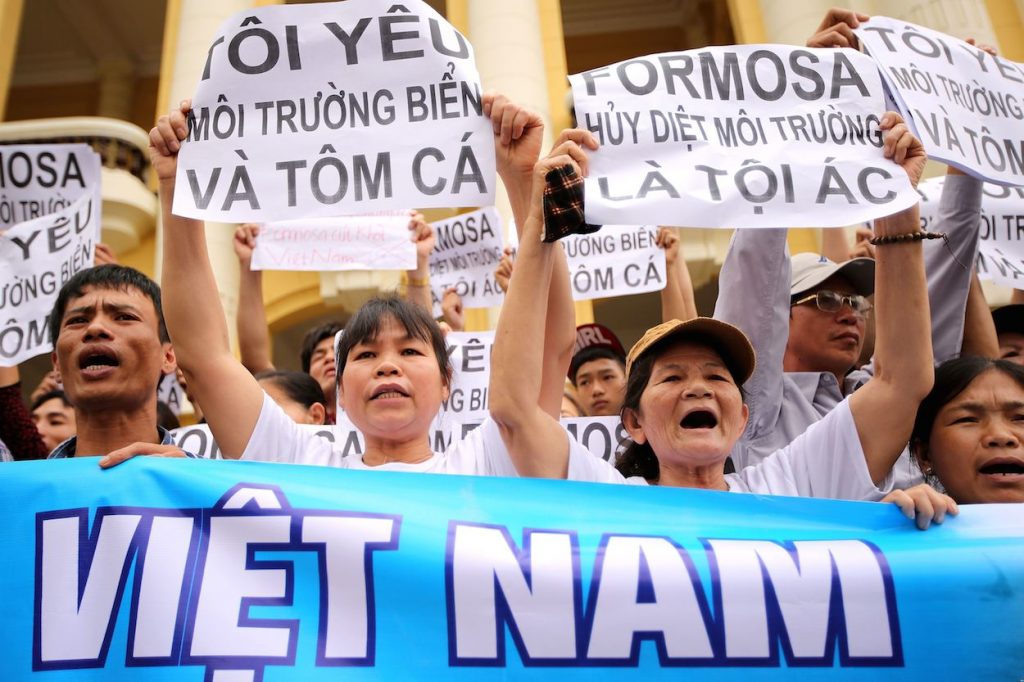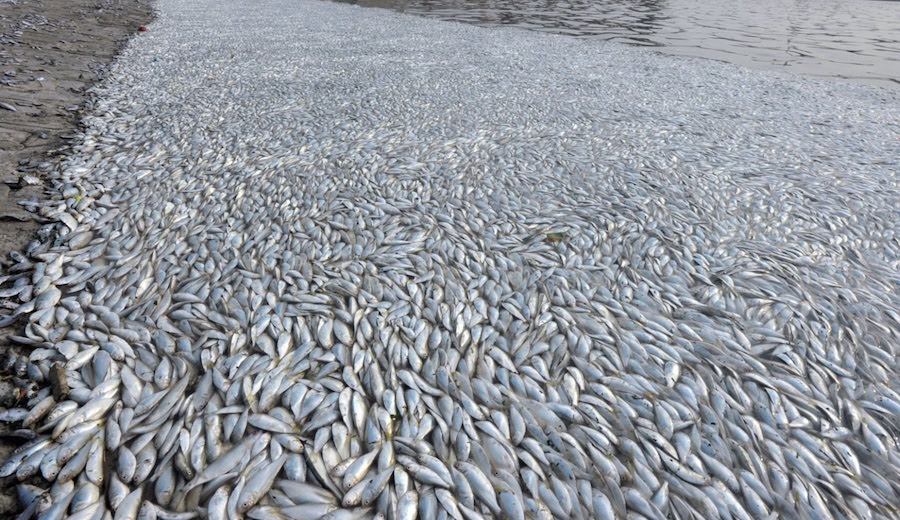by Brian Hioe
語言:
English
Photo credit: YouTube
IT’S A STORY one hears too much in Taiwan. A large corporation engages in wanton environmental destruction and is allowed to get away with it the collusion of the local government. Such cases provoke outrage from environmental activists, but in the end, the corporation is still allowed to get away with minimal punishment, with the suggestion of some cash payout but in which issues of justice remain unresolved.
When Taiwanese corporations engage in these kinds of practices abroad, however, one finds that they are little discussed. This would be the case with mass fish die-offs caused by pollution from a Taiwanese-owned Formosa Steel plant in Vietnam.
Reports of fish die-offs began early in April, but the fish die-offs escalated as the month went on, with millions of fish washing up across four provinces in central Vietnam, Ha Tinh, Quang Binh, Quang Tri and Thua Thien Hue. Fishing villages were severely affected, with boats not sailing and seafood restaurants having no fish to serve, and many avoiding fish for fear of contamination.
 Demonstrators in Vietnam. Photo credit: VOA
Demonstrators in Vietnam. Photo credit: VOA
Last week, pollution from Formosa Steel was officially acknowledged by the government as the cause of fish deaths. Formosa Steel executives apologized and vowed to pay out $500 million to victims. But this only came after a wave of popular protest in Vietnam, in which protest is rare because of government suppression. Over 500 were arrested during protests.
Protestors demonstrated both against Formosa Steel and against the Vietnamese government’s handling of the incident. Namely, Formosa Steel did not originally own up to wrongdoing for the incident, claiming that Vietnamese would have to chose between choose between the economic development which would come with Formosa Steel plant or fish, and also denying responsibility that their plant was the cause of fish die-offs. This was not the first time that Formosa Steel had become a target of public ire, either, after a scaffolding collapse at a Formosa Steel plant in Vietnam led to sixteen deaths in March of 2015, reportedly after a manager forced workers back to work despite their worries that the scaffolding was near collapse.
Likewise, the Vietnamese government originally sought to defend Formosa Steel, by claiming that the cause of fish die-offs was unknown, and arresting journalists who reported on the fish die-offs as inciting public disorder. It seems probable that the Vietnamese government under the Vietnamese Communist Party was attempting to defend Formosa’s investment in Vietnam, given that the steel mill constructed by the company is a $10.6 billion USD investment. It is because public pressure built to a sufficient degree that the Vietnamese government was forced to back down, leading to this about-face from Formosa Steel.
 Photo credit: YouTube
Photo credit: YouTube
It remains to be seen whether the pay-off by Formosa Steel will actually happen. In truth, the pay-off also remains a form of evading responsibility, it being opaque as to who the funds will be distributed to and how exactly an amount of $500 million USD was arrived at for settlement. $500 million is also probably too small an amount for actual compensation of damages, but it may be that the Vietnamese government and Formosa Steel want to declare the issue settled. It may take further struggle for actual environmental justice to be realized. The Vietnamese government currently calls for Formosa Steel to change the technology used at its plant, but this suggests that Formosa Steel will continued to be allowed to operate in Vietnam.
Yet we may note the generally quiet response within Taiwan. Some legislators from the Democratic Progressive Party have raised the issue as potentially threatening to ties between Vietnam and China, as well as Tsai Ing-Wen’s planned “New Southwards Policy” that emphasizes building economic and political ties between Taiwan and Southeast Asian countries. Some demonstrations from Vietnamese migrant workers in Taiwan also took place in Taipei.
However, there was generally no response to the matter from Tsai Ing-Wen’s government or from Taiwanese activists. One suspects that Tsai’s general silence on the matter may be because is unwilling to offend the ruling Vietnamese government, a potential ally against China—never mind that this means siding with an authoritarian government over the people of Vietnam. The Ministry of Foreign Affairs has, however, urged the Vietnamese government to defend the legitimate assets of Taiwanese businessmen in Taiwan, suggesting possible fears of reprisals against Taiwanese businessmen in Vietnam by the Tsai administration, as in past cases of protests against Chinese or Taiwanese owners of factories in Vietnam.
What does this mean for Tsai’s “New Southwards Policy,” then? Does Tsai’s “New Southwards Policy” merely consist of Taiwanese companies exploiting workers in Southeast Asian countries and causing environmental damage to Southeast Asian countries? If Taiwanese-owned companies as Pegatron and FoxConn are already infamously the target of ire from Chinese workers, with the view of Taiwanese as capitalist exploiters, does weaning the Taiwanese economy off of dependence on China just mean shifting away from economic dependence on China just mean becoming an exploiter of Southeast Asian nations as Vietnam?
On the other hand, where there is a precedent for Taiwanese youth activists to side with those who suffer injury from Taiwanese-owned companies—laid-off South Korean workers from the Taiwanese-owned Hydis corporation who came to Taiwan to demonstrate their company’s Taiwanese management in summer 2015 being a notable example—this did not happen in the case of fish die-offs in Vietnam. One suspects that too little were aware of the issue, even if, for example, Taiwanese public television would produce a documentary about the fish die-offs.
As the issue is ongoing, then, it may be incumbent to raise further awareness of the incident in Taiwan. The actual questions of environmental justice in Vietnam have yet to be solved.

